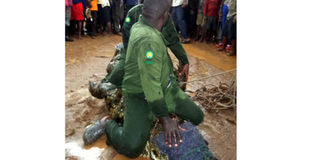Prime
Mayuge registers decline in crocodile attacks, deaths

UWA officials drag a crocodile which was terrorizing residents on Bukhooli Island in Namayingo District onto the shores of Lake Victoria in September 2018. Leaders in Mayuge District say there is a decline in crocodile attacks. PHOTO/ FILE
What you need to know:
- Mr Isa Kantinti Hiryagana, the Bukaleba Parish chairperson, said the last crocodile attack was in August last year when a 40-year-old man only identified as ‘solar’ was mauled by the reptiles.
- On March 9, 2009, 50-year-old John Wamala, a resident, was mauled to death by a crocodile, leaving behind a wife and five children.
Authorities in Mayuge District have revealed that they have registered a decline in attacks and deaths caused by crocodiles.
The district environment officer, Mr Thomas Aram, told Daily Monitor on Tuesday that between 2009 and 2014, they registered more than 20 crocodile attacks and deaths per year compared to the three deaths registered last year.
“The three deaths registered last year each occurred at Busuyi Landing Site in Wairasa Sub-county, Namoni and Bugoma landing sites in Malongo Sub-county,” Mr Aram said.
He said the crocodile population and their breeding areas have also reduced and that the few attacks are because people move to where the crocodiles breed.
According to Mr Aram, natural forests in Malongo and Kityerera sub-counties provided a perfect cover for the reptiles but most crocodiles have since migrated to Kenya and Buvuma Island.
Mr Isa Kantinti Hiryagana, the Bukaleba Parish chairperson, said the last crocodile attack was in August last year when a 40-year-old man only identified as ‘solar’ was mauled by the reptiles.
“The deceased told his wife that he was going fishing and when he got to the landing site, he removed his gumboots, but unfortunately didn’t go far as he was immediately mauled by a waiting crocodile,” he said
While the reptiles are reported to have invaded the area around 1996 and made access to water in most parts of the district, the situation has been risky and the attacks worsened in 2011, Mr Aram says.
“Around 2011, government allocated several acres of forested land to communities and residents started destroying the trees, paving way for a full-blown crocodile invasion,” Mr Aram said.
He added that because the crocodiles’ habitats was destroyed the reptiles are struggling to find food thus attacking human beings.
“The forests had wild animals such as bushbucks and wild pigs which are food for the crocodiles; but since the forests were destroyed, the crocodiles are now feeding on human beings,” he explained.
Statistics from the district indicate that in April 2010 alone, at least 15 people were attacked by crocodiles, three of whom were killed while the rest escaped with serious injuries. Then between 2004 and 2010, more than 100 people were attacked by the man-eaters, 50 of whom were killed.
“The Uganda Wildlife Society (UWS) conducted a survey on why crocodile deaths were on the rise in Mayuge District and it was revealed that there was a human-crocodile conflict for resources, destruction of the habitats and cultivation of crops up to the edge of the lake were the factors,” Mr Aram said.
In 2016, the UWS and the Uganda Wildlife Authority (UWA) set up two enclosures made of metals and wire mesh at Jaguzi Landing Site and another at Walumbe Landing Site, to ward off crocodiles.
They also held sensitisation meetings in communities affected by the crocodile attacks.
Mr Malijani Isabirye, the Mayuge District vermin control officer, attributed the decline in crocodile attacks and deaths to reduction in water levels, intervention from UWA and mass sensitisation of residents, especially in prone areas such as Malongo Sub-county.
PREVIOUS CASES
On March 9, 2009, 50-year-old John Wamala, a resident, was mauled to death by a crocodile, leaving behind a wife and five children.
In May 2010, a 30-year-old resident only identified as Obera eaten by a crocodile at Nakalanga Landing Site.
On April 17, Mr Isaka Nasiko, 20, was also attacked by a crocodile at Kifu, Bugoto Landing Site and his body parts later recovered near the lake .
In the same year and place, on May 3 a 17-year-old boy was eaten up by a crocodile.





